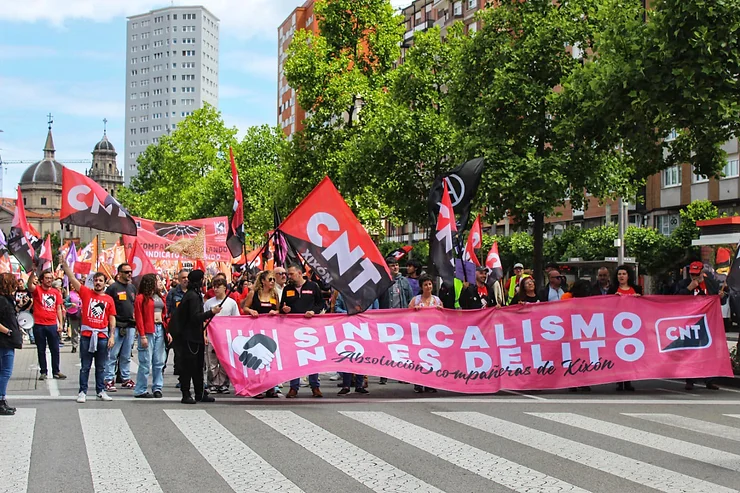In the summer of 2022, I gained insight into the British penal system when I was jailed for a month following direct action against Elbit—this is my prison diary (pt.5)
In the summer of 2022, I gained insight into the British penal system when I was remanded to Her Majesty’s Prison Eastwood Park. I was sent to jail for one month along with eight other activists following direct action in Bristol against Elbit Systems, Israel’s largest private arms company. During the month I spent in the penitentiary, I documented everything I saw, heard, felt, and thought as a form of resistance. This is my prison diary (pt.5).
The British prison system is a microcosm of capitalism: Under the capitalist mode of production, workers fund the capitalist’s entire enterprise; they fund the means of production and even pay for their own wages with their own unpaid labour. This is also the case in Her Majesty’s prison, where prisoners pay for their imprisonment with unpaid labour, i.e. slavery. All prison maintenance – ranging from five times a day of water distribution, food distribution, cleaning, laundry, teaching, counseling, emotional and mental support, and every other necessary task – is funded with prisoners’ labour. Even some medical procedures are sometimes performed by prisoners on themselves and by themselves.
“The Orderlies”, the women employed in cleaning and distributing hot water, are considered model prisoners and highly privileged for that reason. They get £0.7/day for many hours of work. The benefits they enjoy include the privilege of leaving their cells throughout the day, unlike the others who are locked up in their cells for almost 24 hours a day. “The Orderlies” are very sweet girls who always smile at the prisoners they serve, which is another form of unpaid labour.
The Neo-liberal order in jail is manifested more than all in the employment of contractor workers, specifically by Secro, a private company responsible for transferring prisoners from jail to court and back again. Secro employs workers who carry the authorities of policemen extra-judicially. They’re not part of the police force tied to the state, but are rather a privately owned company that was leased to operate the prisoners transfer vehicles, which are massive trucks with inner iron cells. In these huge trucks, Secro cages the prisoners in small metal seats with both external and inner windows. These cells remind me more of what is known as a “Sodomy seat” in Hebrew than vehicles designed for human transportation. Each of these cells is locked manually and is the size of a chair. Some cells have seat belts, and others don’t, so the prisoners have to hold their heads in their hands to prevent injury in case of an accident. Once the prisoners arrive in jail, they must report if Serco has treated them well. It’s similar to giving consent to DNA sampling when arriving in custody at the police station – an act which is not at all consensual because the police can take it by force if not granted “consent”.
Other cops might as well be contracted employees. They do their job at the most basic level. Some of them, unlike the pigs of apartheid, maintain the dignity of the prisoners, but would not go out of their way to meet the most basic requests of the prisoners, such as answering basic questions. Many of them will do emotional labour until a certain point, but would show apathy and indifference afterward as they are simply not paid enough.
When they talk to one another, the guards are sharing information about new job opportunities. They share their experiences working in different jails, including Belmarsh, where Julian Assange is imprisoned. Some of the Belmarsh guards were re-assigned for duty to do some jailing here in Eastwood Park. They were used to a high level of violence, so I’ve heard one of the guards saying. The guards who took us down to the court’s basement at the Magistrates court house showed us kindness and even smiled back at us when we smiled. They were rather loud when talking about football. Among them there was only one woman who was probably employed to be able to search the female prisoners. They all serve the state and the upper class who takes advantage of their social dispossession.
Although they can surely turn a blind eye, some guards choose to enforce the ban on clothes exposing one’s belly. They call the prisoners to lower their crop tops. Despite that I was surprised to know that the prison is not as indoctrinating as I thought it would be, although all inmates must confirm in writing that they don’t belong to any radical left, anarchist, or an environmental group, and that they won’t speak against the “liberal democratic values” of the country nor the Queen – a performative contradiction of the most reactionary kind!
The food distributed in jail is surprisingly good. In Germany, it would be considered “delicates”. The meals include all the nutrients, but are rich in sugar and milk, which the prisoners are constantly bombarded with. I was privileged enough to be getting a vegan diet and although I could ask to receive gluten-free food, I was hesitant to do that in fear of reducing my caloric intake. I need every piece of energy I can get and certainly not lose weight in here.
Most women dye and bleach their hair. The bleaching product is cheap to consume and passes the time in creating some esthetic change in appearance. Apart from the endless chase of sugar, the women here are constantly after fill-ins for their nicotine vapes – the only allowed form of smoking. Vaping is the center of the prisoners’ life. They get the vaping device (“pen”) when arriving to prison in addition to one dose, and then they must buy more of the fill-ins – each package costs almost £4, and it lasts only a short time.
The prison economy seems to be predominantly shaped by trauma and post-trauma, which are more common than tea in here. When I was interviewed on my first day at the prison, the officer asked me whether I’d suffered violence in my childhood or sexual violence, etc. I’ve replied that I’m a woman, and therefore, chances are 1/1 that I experienced at least one form of abuse. I was surprised she confirmed what I said and didn’t argue with me. Everyone here has PTSD, which dictates the entire array of mental health aid and the medical resources necessary to treat the pathologies caused by trauma. Despite that, the prisoners do not receive anti-depressants or anxiety blockers treatment, although some beg to have them. I, too, did not receive my medicines against Hypothyroidism and hormonal treatment for Endometriosis. Every medicine requires a doctor’s prescription, and doctors are simply nonexistent in prison, although one would imagine that marginalized populations like prisoners would be all the more in need of a doctor due to neglect or lack of access to medical treatment. Psychotherapy and mental health support are also impossible to get; instead, the prisoners are directed to some kind of semi-religious organization – the Semerians – which lend their ears to the prisoners. However, most of the emotional labour is done by the prisoners simply by listening to one another.
Despite being dependent on private services, prison is the closest to an autarkic market. Products like bed sheets and duvets are produced by the prisoners to pay for their own imprisonment. The prison industry meets the prison’s needs by having the incarcerated produce their own essentials for a petty wage. The prison authorities then reallocate the profit from unpaid labour to fund jailing itself – and it works just like on the “outside”, beyond the walls of the prison where the capitalist mode of production governs all aspects of being.
Last night there was an “incident” in Res 3. According to the prisoners, there was a fight going on. The entire prison was under lockdown, and it was impossible to leave the cells. All the guards were sent to deal with the fight. The fight destabilized the prison routine because the jailers had to end their shift at midnight after they had to report back to work at 7AM the following day, so they had almost no sleep. The guard that was sent to our unit was looking very tired. This is why nobody bothered her with administrative questions.
The fate of the guards is worse than ours, prisoners. They, too, are required to pay with their own unpaid labour for the prison’s profits. I have compassion for them, although they’ve chosen a livelihood rooted in oppression. They serve the same system that oppresses them and that led them, or perhaps forced, to take on this job in the jailing business. If they had other opportunities, they would have taken them. The jailers hate their jobs, and I can’t blame them. Some of the guards have a genuine interest in violence and in stopping violent people and bullies. When one of the guards spoke of how much she hates bullies, I could see she’s been a victim of violence herself. Her colleague, another female guard, looks older. She’s in her late 40s, perhaps. She told me that I was fitter than her. Perhaps she has a family and children to provide for, and maybe that’s why she’s taken this job; I can only speculate.
Jail staff is constantly in shortage, and there’s not enough manpower to attend to the needs of the prisoners or even to get them in and out of the cells when needed. This is why the prisoners can find themselves crowded in the narrow hall on the way to the 30-minutes daily exercise (even dogs are taken out for a walk at least three times a day). It’s an invitation for chaos and violence – and it is designed to cause exactly that, to keep the prisoners in an endless limbo so they can be further exploited.
The prisoners are fed simple carbohydrates such as white bread, jam, sugar, cornflakes, etc. They always remain hungry. I give the women in my unit all the food I don’t consume, especially the coffee whiteners. The amount of lactose being digested here is enormous, and most women complain of stomach pain.
If only a more suitable nutrition was considered, much suffering could have been spared. Still, the industries seek to constantly valorize their profits. Their products encourage consumer dependency, which only increases profits and continues the cycle of dependency. The dependency becomes even stronger among vulnerable women who are detoxing from drugs. I have solidarity with them all!








